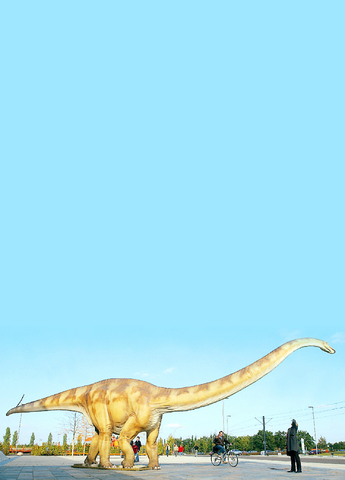Widespread volcanic eruptions that led to global warming were likely the cause of massive extinctions 250 million years ago, not the impact of an asteroid or comet, according to two studies published in the online edition of the journal Science.
The catastrophe called the "Great Dying" wiped out 90 percent of the planet's marine life and 70 per cent of all plant and animal life. The most recent popular scientific belief about what caused it was the impact of a large object from space, but the examination of sediment and fossils deposited at the time has led two groups of scientists to rethink those beliefs.
"Animals and plants both on land and in the sea were dying at the same time and apparently from the same causes -- too much heat and too little oxygen," said Peter Ward, a University of Washington paleontologist and lead author of one of the studies.

In the research published in Science Express, the online version of the journal Science, and slated to be published in Science's print edition, the groups found increased levels of sulphur and depleted oxygen in the ancient rock.
Ward and his team of researchers from the US and South Africa, surmised that the sulphur came from continuous volcanic eruptions in an area known as the Siberian Traps. The eruptions warmed the Earth, trapping sunlight and depleting oxygen in the air, he said.
At the same time, the Earth's shifting tectonic plates lowered the levels of the ocean, exposing seabeds and releasing methane trapped in the sediment there, further stoking the global warming, the research indicated.
"I think temperatures rose to a critical point," Ward said. "It got hotter and hotter until it reached a critical point and everything died."
"It was a double-whammy of warmer temperatures and low oxygen, and most life couldn't deal with it," he added.
He said temperatures around the world rose 80C, killing off plants, which served as food for many animals, starving them.
In addition, he said, oxygen levels dropped to about 16 percent of the atmosphere when normal levels today are at 21 percent. Such a drop would be equivalent to trying to breathe on top of a 4,250m mountain, he said.
"High and intermediate elevations would have become uninhabitable," he said. "More than half the world would have been unlivable. Life could only exist at the lowest elevations."
The Great Dying occurred between the Permian and Triassic periods, when all of today's continents were concentrated in one great land mass called Pangea.
Ward and his team studied 300m-thick sediment from Pangea, today's Karoo Basin in South Africa and off the coast of China, while a second team, led by Kliti Grice, a paleontologist with Curtin University of Technology in Perth, Australia, looked at sentiment from the Perth Basin.
Ward said the findings of the two teams were "eerily similar."
Grice's researchers -- from Australia, China, the US, Germany and Britain -- found that the ocean was low in oxygen and teeming with sulphur-loving bacteria while Ward's team found that life had been dying off slowly for about 10 million years before a rapid dying rate marked the next 5 million years.
The scientists said they found no evidence of an impact by an asteroid or comet. They said that if an impact had occurred, it would have been a minor element in the mass extinction.

On April 26, The Lancet published a letter from two doctors at Taichung-based China Medical University Hospital (CMUH) warning that “Taiwan’s Health Care System is on the Brink of Collapse.” The authors said that “Years of policy inaction and mismanagement of resources have led to the National Health Insurance system operating under unsustainable conditions.” The pushback was immediate. Errors in the paper were quickly identified and publicized, to discredit the authors (the hospital apologized). CNA reported that CMUH said the letter described Taiwan in 2021 as having 62 nurses per 10,000 people, when the correct number was 78 nurses per 10,000

As we live longer, our risk of cognitive impairment is increasing. How can we delay the onset of symptoms? Do we have to give up every indulgence or can small changes make a difference? We asked neurologists for tips on how to keep our brains healthy for life. TAKE CARE OF YOUR HEALTH “All of the sensible things that apply to bodily health apply to brain health,” says Suzanne O’Sullivan, a consultant in neurology at the National Hospital for Neurology and Neurosurgery in London, and the author of The Age of Diagnosis. “When you’re 20, you can get away with absolute

May 5 to May 11 What started out as friction between Taiwanese students at Taichung First High School and a Japanese head cook escalated dramatically over the first two weeks of May 1927. It began on April 30 when the cook’s wife knew that lotus starch used in that night’s dinner had rat feces in it, but failed to inform staff until the meal was already prepared. The students believed that her silence was intentional, and filed a complaint. The school’s Japanese administrators sided with the cook’s family, dismissing the students as troublemakers and clamping down on their freedoms — with

As Donald Trump’s executive order in March led to the shuttering of Voice of America (VOA) — the global broadcaster whose roots date back to the fight against Nazi propaganda — he quickly attracted support from figures not used to aligning themselves with any US administration. Trump had ordered the US Agency for Global Media, the federal agency that funds VOA and other groups promoting independent journalism overseas, to be “eliminated to the maximum extent consistent with applicable law.” The decision suddenly halted programming in 49 languages to more than 425 million people. In Moscow, Margarita Simonyan, the hardline editor-in-chief of the